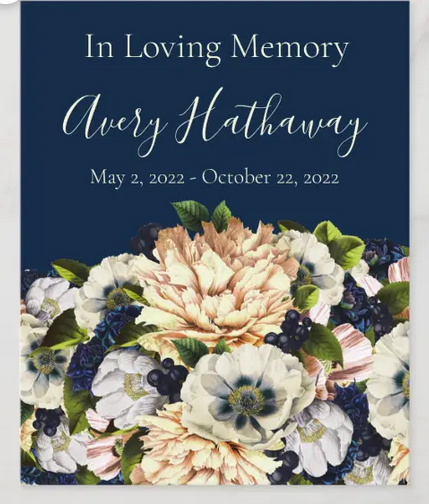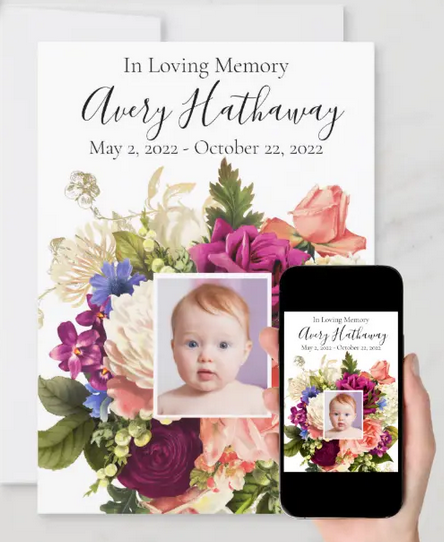We may earn money or products from the companies mentioned in this post. As an Amazon Associate I earn from qualifying purchases. Disclosure of Material Connection: Some of the links in this post may be "affiliate links." This means if you click on the link and purchase an item, I will receive an affiliate commission.
If you are researching all things related to funerals, memorials and celebration of life services, I’ve got you. You might be looking for details on exactly what is a funeral program. This program can serve several purposes. They can help guests to know what to expect during the service, and they can provide a way for guests to learn more about the deceased and to share their condolences with the family. Funeral programs can also be a cherished keepsake for guests, and they can help to preserve the memory of the deceased.
What is a Funeral Program?
A funeral program is a printed document that is distributed to guests at a funeral or memorial service. It typically includes information about the deceased, such as their name, birthdate, deathdate, and family information. It may also include a brief biography of the deceased, eulogies, poems, prayers, and other tributes.
What Typically Includes in a Funeral Program?
The content of a funeral program will vary depending on the wishes of the family and the deceased.

However, there are some common elements that are often included in funeral programs. These elements may include:
- Obituary: The obituary is a brief biography of the deceased, typically including their birthdate and deathdate, their family and friends, their career and accomplishments, and any other relevant information.
- Eulogy: The eulogy is a speech given by a close friend or family member of the deceased, in which they share their memories and thoughts about the person who has died.
- Bible verse or poem: A Bible verse or poem can be a beautiful and meaningful addition to a funeral program. It can offer comfort and support to those who are grieving, and it can help to celebrate the life of the deceased.
- Photographs: Photographs can be a wonderful way to remember the deceased and to share their story with others. They can be included in the funeral program, or they can be displayed at the funeral service itself.
- Music: Music can be a powerful way to express grief, hope, and love. It can also help to create a sense of community and support at a funeral service.
- Prayers: Prayers can be offered for the deceased, for their family and friends, and for the world at large. They can help to comfort those who are grieving, and they can offer hope for the future.
- Words of encouragement: Words of encouragement can be offered to those who are grieving, reminding them that they are not alone and that they will get through this difficult time.
- Call to action: The funeral program can end with a call to action, such as a request for donations to a charity in the deceased’s name or an invitation to attend a memorial service.
- Thank-yous: The funeral program can also be used to thank those who have helped the family during this difficult time, such as the funeral home, the clergy, and the friends and family who have offered their support.
- Closing remarks: The funeral program can end with closing remarks, such as a quote from the deceased or a prayer.

Why is a Funeral Program Important?
Funeral programs can be a valuable resource for grieving families and friends. They can help to provide structure and comfort during a difficult time, and they can help to preserve the memory of the deceased. Funeral programs can also be a cherished keepsake for years to come.
If you are planning a funeral or memorial service, consider creating a funeral program. It can be a meaningful way to honor the life of your loved one and to help those who are grieving.
Here are some tips for creating a funeral program:
- Start planning early. Funeral programs can take time to create, so it is important to start planning early.
- Involve the family. The funeral program should reflect the wishes of the family and the deceased.
- Choose a format. There are many different formats for funeral programs. Choose one that is appropriate for the occasion and that will be easy to read.
- Include the right information. The funeral program should include the following information:
- The name of the deceased
- The date and time of the service
- The location of the service
- The officiant
- The pallbearers
- The order of service
- Any other information that you think is important
- Get feedback. Once you have created a draft of the funeral program, get feedback from family and friends. This will help you to ensure that the program is accurate and that it meets the needs of everyone involved.
- Proofread carefully. Before you finalize it, proofread it carefully for any errors.
Creating a celebration of life program or oder of service can be a daunting task, but it is a worthwhile one. A well-crafted funeral program can provide comfort and support to those who are grieving, and it can help to preserve the memory of the deceased.


